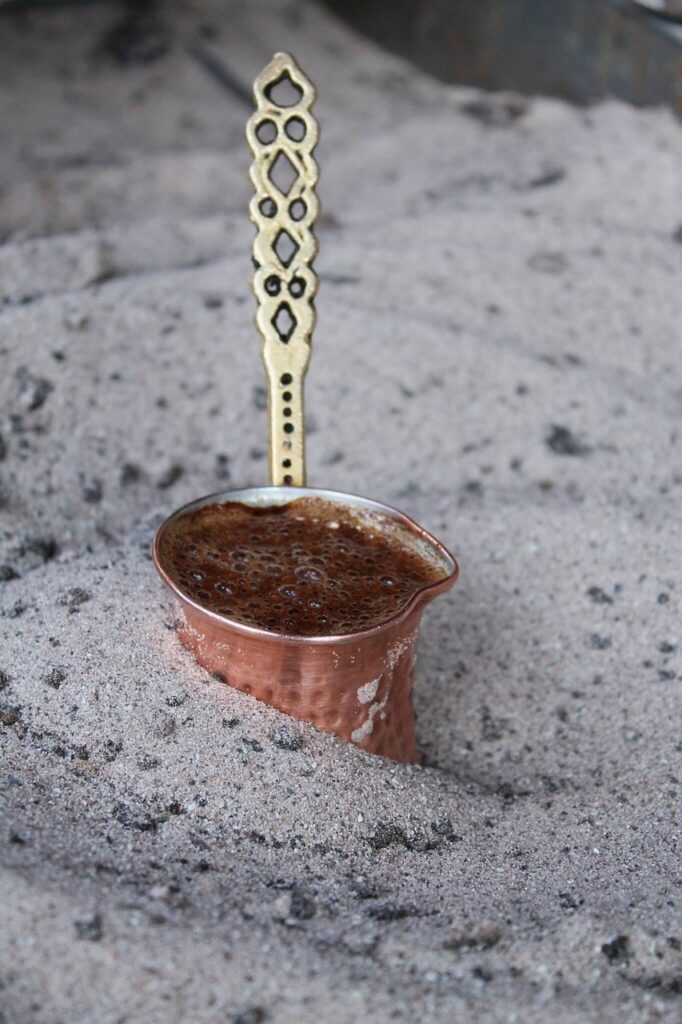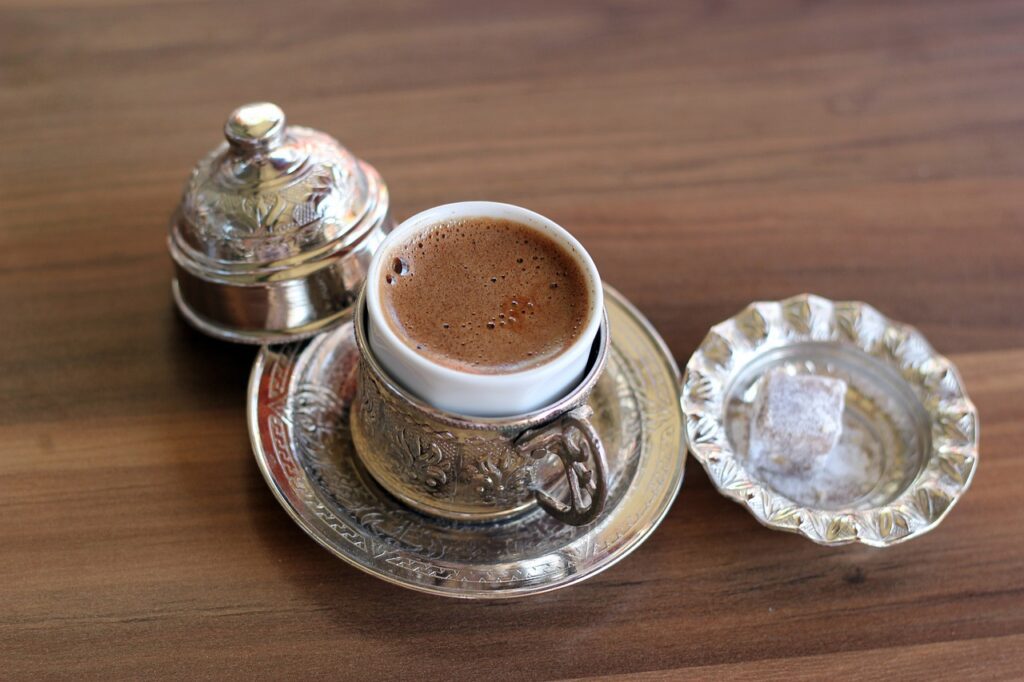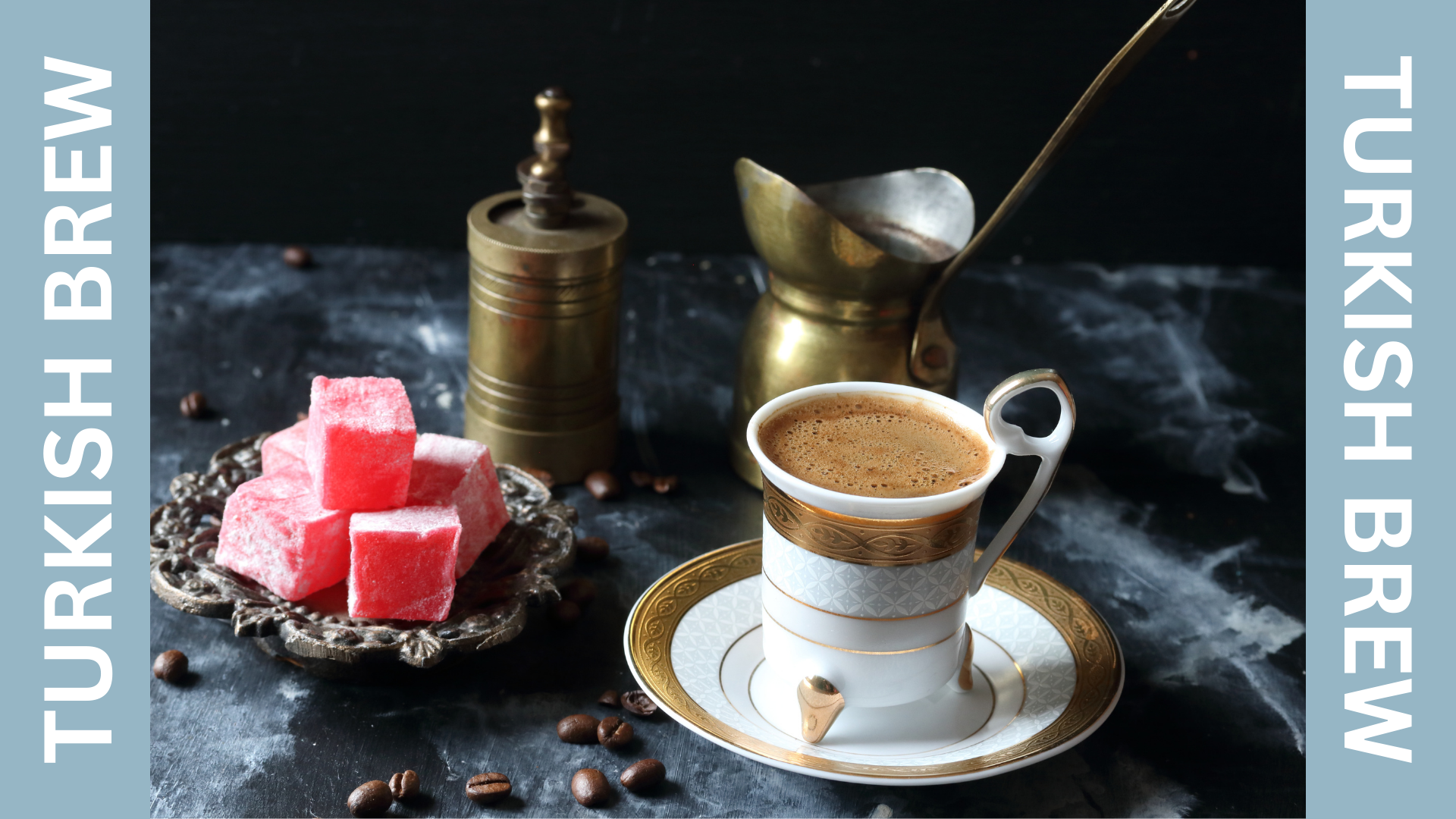
Disclaimer: Some of the links within this post are affiliate links which means if you click on our recommended products and decide that product is right for you, I may earn a commission on that purchase at no cost to you. As an Amazon Associate, I earn from qualifying purchases. All content and opinions remain my own.
An Absolute Turkish ‘Delight’: You Have To Try This Coffee Technique
Table of Contents
Origins of Turkish Coffee
The origins of Turkish coffee trace back to the 15th century during the Ottoman Empire’s encounter with coffee in Yemen. After their conquest of the Yemeni city of Mocha, the Ottomans discovered and brought back the cherished coffee beans. This event was crucial in the annals of coffee, leading the Ottomans to perfect their brewing techniques.
They innovated a method that involved the fine grinding of coffee beans and simmering them with water and sugar in a specific type of pot known as a cezve. This technique evolved into the brewing style we recognize today as Turkish coffee. It swiftly integrated into Turkish cultural and social practices, often paired with the tradition of reading fortunes from the remaining coffee grounds in the cup.
Coffee Brands: The Best Experience
To ensure an authentic Turkish coffee experience, starting with the right coffee is crucial. Here are some we know of and well documented across the globe:
- Kurukahveci Mehmet Efendi: Renowned for its authentic flavor and popularity in Turkey and globally, it’s the best-selling Turkish coffee brand.
- Kahve Dünyası: A well-regarded brand offering a variety of roasts, including dark and medium.
- Hisar Kahve: Known for its unique range of flavors and long-lasting aroma.
- Al Ameed Gourmet: A blend that comes flavored with cardamom, offering a smooth drinking experience.
- Selamlique’s Mastic Flavored: Popular in Turkey’s Anatolia region, it features a distinctive woodsy flavor.
- Shazel: A convenient instant Turkish coffee option.
- Kahve Dunyasi: Another popular choice in Turkey, known for its quality and authentic experience.

Brewing Turkish Coffee: A Step-by-Step Guide
- Ingredients & Equipment:
- Turkish coffee (7-10 grams per cup)
- Water (approximately 50 ml per cup)
- Sugar (optional, to taste)
- A cezve (Turkish coffee pot)
- A heat source
- Grinding: Turkish coffee requires a very fine grind, almost like flour or powdered sugar. This fine grind is essential for the signature thick, velvety texture of the coffee.
- Combining Ingredients: Place the coffee, cold water, and sugar (if using) into the cezve. Stir until well mixed.
- Heating: Heat the cezve on a low flame. Slow and gentle heating is key to achieving the perfect foam.
- Watching the Foam: As the coffee heats, a dark foam will start to rise with bubbles around the edges. Just before it boils, remove the cezve from the heat.
- Serving: Pour the coffee gently into small cups, ensuring that the foam is evenly divided between them. Allow the coffee to settle for a minute before drinking to allow the grinds to settle and sink to the base of the cup.
- Enjoying: Turkish coffee is traditionally enjoyed slowly, savoring each sip. Pair it with a glass of water and perhaps a small sweet treat.
Recommended Equipment
Let’s Sum It Up!
Turkish coffee is much more than just a beverage; it’s a rich tapestry of history, culture, and culinary art. The practice of brewing Turkish coffee, which dates back to the 15th century Ottoman Empire, is not only about the preparation of a drink but also about preserving a tradition that has woven itself into the very fabric of Turkish society and beyond. This brewing method, characterized by finely ground coffee beans simmered with water and sugar in a cezve, has transcended time to become a globally recognized symbol of Turkish hospitality and craftsmanship.
The ritual of preparing and enjoying Turkish coffee is an experience that goes beyond taste. It’s about the connection with a centuries-old tradition, a moment of pause in our busy lives, and the pleasure of savoring a cup of coffee that has been prepared with care and attention to detail. The thick, velvety texture and robust flavor are not merely the results of a brewing technique; they are the culmination of history, culture, and the collective love for coffee.
Moreover, it has a social aspect that is as important as the drink itself. It’s often enjoyed in gatherings, where conversations flow and bonds are strengthened over each meticulously prepared cup. The tradition of fortune telling by interpreting the coffee grounds adds a mystical dimension to the experience, making each cup a journey into the unknown.
As you explore the world of Turkish coffee, remember that each sip is a homage to its rich heritage. Whether you’re a long-time enthusiast or a newcomer eager to explore, Turkish coffee offers a unique window into a world of flavor and tradition. So, gather your cezve, choose your favorite Turkish coffee brand, and embark on a journey that promises much more than just a caffeine fix. It’s an invitation to partake in a centuries-old ritual that has the power to transform your coffee experience into something truly extraordinary.

Ready to immerse yourself in the world of Turkish coffee? Whether you’re seeking the deep heritage of Kurukahveci Mehmet Efendi or the modern twist of Shazel’s instant Turkish coffee, there’s a perfect blend waiting for you. Start your Turkish coffee journey today!

For more coffee brewing tips check out our other blog posts here, or contact us if you would like us to delve deep into a particular type of brewing method you are interested in.




